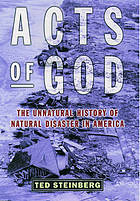By Anto Mohsin
PhD Candidate, Science and Technology Studies, Cornell University

Themes and Rationales:
This module is drawn from my undergraduate writing seminar called “Technology and Society: Examining Technological and Natural Disasters,” taught at Cornell University in the Fall 2013. The two readings below are taken from the syllabus. The first is a selection from an anthology of essays edited by William Cronon, a well-known American environmental historian. The other reading is the introductory chapter of a book penned by another noted American environmental historian. Drawing on the works of environmental history helps our understanding of the concept of nature in a society, which can aid our comprehension in examining so-called “natural” disasters.
Cronon’s essay critically analyzes the idea of nature in American history. In this chapter, he highlights two key insights of the book that challenges a popular American thinking about nature. Cronon contends that nature is not a stable system and that nature “is a profoundly human construction” (25). Relating these important findings with a disaster, Cronon writes that an earthquake may be thought as a natural disaster (movement of fault lines cannot be attributed to human’s doings). But the he adds, “[the] differences in the way the earthquake affected the built environment reflect the differences in the social environment, not the natural one” (30). In other words, human decisions are implicated even in “natural” catastrophes such as earthquakes and floods.
Many people still interpret natural disasters as a sign of God’s wrath brought down on societies for their supposed wrongdoings or moral decadence. Often governments in these societies use this idea to naturalize disasters or as an excuse for their inactions to help the victims in the wake of disasters. In Acts of God, Ted Steinberg challenges this notion and seeks to examine the unequal structure of class in a society, and its relationship to the handling of natural disaster.
To illustrate his argument, Steinberg uses an example of a flood that occurred in Hannibal, Missouri, which is the hometown of the American writer Mark Twain. When the flood of 1993 engulfed Hannibal, the wall that the government erected in the 1970s successfully protected Twain’s house. But the wall did not protect the town residents equally. Families living in poor areas of Hannibal, which were left unprotected because of a plan to build a wall in the 1960s to protect these areas and the city’s downtown was abandoned, suffered the brunt of the disaster. “Ultimately,” Steinberg writes, “[his book] critiques the approach to natural calamity that has dominated U.S. politics over the last century. This approach has tended to overemphasize the natural factors at play while diminishing the human, social, and economic forces central to these phenomena” (xix).
Readings:
Cronon, William. “Introduction: In Search of Nature,” in William Cronon, Uncommon Ground (W.W. Norton & Company, 1995), pp. 23-56.
Steinberg, Theodore. Acts of God (Oxford University Press, 2000), pp. xv-xxiii.
![[Teach311 + COVID-19] Collective](https://blogs.ntu.edu.sg/teach311/files/2020/04/Banner.jpg)